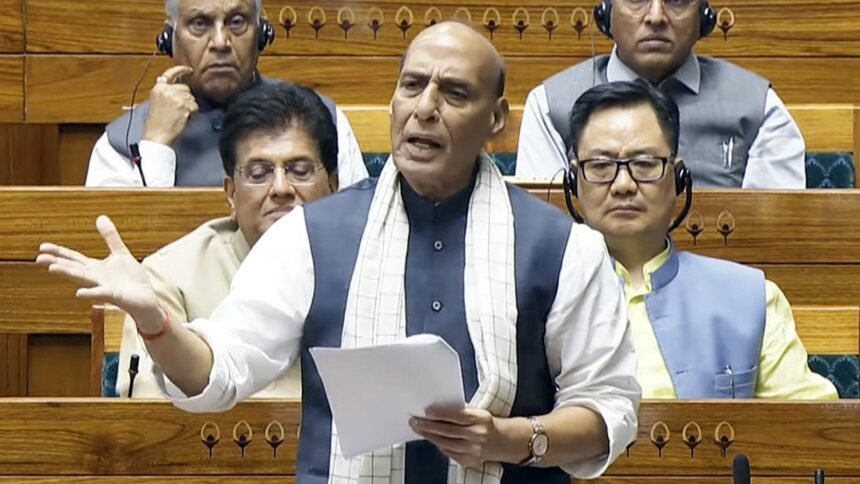Defence Minister Rajnath Singh told Lok Sabha Monday that India had fulfilled all its objectives in Operation Sindoor, agreed to a ceasefire when Pakistan requested it without any pressure, and added that the Opposition was not asking the right questions when it sought to know how many planes were shot down. He was speaking to initiate the 16-hour debate in Parliament on Operation Sindoor.
He underlined that Operation Sindoor had been halted and not ended, and India would once again give a befitting reply if Pakistan sponsored any other terror attack, as a “new Lakshman Rekha had been drawn”. He added that India would not accept any nuclear blackmail.
“In any exam, the result matters. We should see whether a student is getting good marks in an exam and not focus on whether his pencil was broken or pen was lost,” Rajnath said, in a dig at questions by the Opposition regarding losses to the Indian Air Force, amid applause from ruling party MPs.
“The Opposition asks about planes shot down. Their question does not represent India’s sentiments. They have not yet asked how many Pak planes were shot down. They should ask: did India destroy terror bases? Yes. Was Operation Sindoor successful? Yes. Were the masters of terrorists who wiped off Sindoor from the foreheads of our sisters destroyed? Yes. Did our soldiers face any losses? No,” Rajnath said, listing out the questions he felt the Opposition should have asked. “Focus on big things, not comparatively small ones; else we lose focus on big issues and the honour of soldiers.”
He added, “We asked in 1962 why another country captured part of our territory. We asked why we lost. We did not ask how many machine guns were damaged. We asked about territory, not equipment. In 1971, Atal Bihari Vajpayee praised the leadership of that time. We did not ask how many Indian planes fell or equipment got damaged in the process of teaching the enemy a lesson.”
‘Aim not to capture land, but destroy terror nurseries’
Rajnath explained the ceasefire after four days of hostility, saying, “Operation Sindoor was halted because we had fulfilled our objectives. To say it was done under any pressure is wrong. The aim was not to capture territory but to destroy their terror nurseries. The aim was not to go to war… Pakistan accepted defeat and requested that hostilities be stopped… We accepted with a caveat. If Pakistan attempts any misadventure, we will again begin this operation.”
The defence minister said India had always wanted peace with neighbours, as it is part of the civilisational values of the country. He recalled Vajpayee’s attempts at peace, and then the Kargil War when Pakistan did not understand the language of peace. He added that Prime Minister Narendra Modi also started with attempts at peace and also visited Nawaz Sharif, but since Pakistan did not understand the language of peace, India undertook a surgical strike in 2016, an air strike in 2019, and Operation Sindoor in 2025.
Rajnath expressed disappointment that the UPA government did not do any such thing after the Mumbai terror attack of 2008. Under the Modi government, he added, “two-day dossiers have been replaced by decisive actions.”
He likened the policy of the Modi government to the strategy of Lord Ram and Lord Krishna. “We haven’t occupied any territory. We also know that one should fight only equals. Lions should not kill frogs – the message it sends is not good. Our army is a lion. Pakistan is nowhere close to us in size or strength. What competition do we have with them? They are reliant on others for aid. Our strategy is against terrorism emanating from there,” Rajnath asserted.
‘Our policy based on strategy of Ram, Krishna’
“We have learnt from Krishna that one can forgive Shishupala 100 times but the Sudarshan Chakra must be used to protect dharma. Ab humne sudarshan chakra utha liya hai (Now we have decided to wield the Sudarshan Chakra). Our policy is based on the strategy of Ram and Krishna, which teaches both dhairya (patience) and shourya (valour). Pakistan did not understand what we were saying; so, we will answer them in this way,” he said.
“Our stand is clear that terror and talks cannot co-exist. A country that has no democracy, sponsors terror and hates India cannot be engaged in dialogue. Blood and talks do not go together,” Rajnath added, reiterating what PM Modi had said after the ceasefire. “Pak-sponsored terrorism is not random madness; there is a method in this madness. It is a toolkit against every civilised code of conduct. Our fight against Pakistan is the contest between civilisation and barbarity.”
He recalled that PM Modi got the world to condemn the Pahalgam terror attack, adding that he (Rajnath) refused to sign a joint statement at the Shanghai Cooperation Organisation (SCO) meet that sought to dilute India’s position on terror. Rajnath rued that the UPA government could not make the Mumbai terror attack a global issue, and also decided not to launch an attack on Pakistan’s terror havens after it.
Underlining that multi-party delegations sent across the world after Operation Sindoor did great work, Rajnath said, “During the operation, all political parties cooperated with the government, and we thank them.” He said Indian forces accomplished the attack on terror hubs in Pakistan in just 22 minutes, and saluted the defence forces for their valour and dedication.






